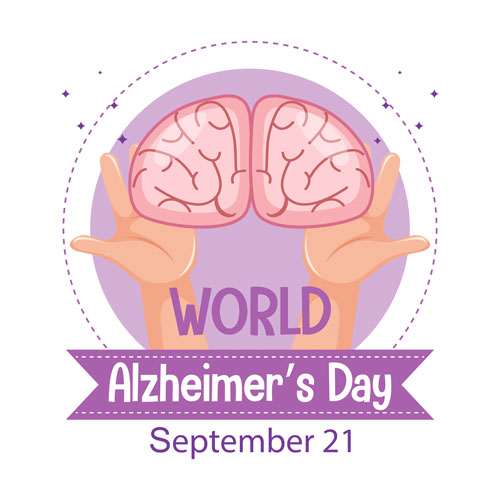September 21st is World Alzheimer’s Day

Alzheimer’s is a disease that is discussed commonly through the years as we age. Our health care providers continuously remind us of the risk factors, symptoms, and chances of us developing this disease. We are taught how to incorporate life style changes into our daily routine in order to decrease our chances of developing any form of dementia, especially Alzheimer’s. This month we celebrate World Alzheimer’s Day; more specifically on September 21st. Not only on this day, but this month we would like to draw our attention to Alzheimer’s: what it is, how it happens, the symptoms, prevention, and more. This is exactly what we are going to talk about in today’s blog.
What is Alzheimer’s Disease?
Alzheimer’s Disease is classified as a type of dementia that affects the brain and its ability to think properly, remember, and control certain behaviors. It is not a disease that comes on suddenly. It develops over time, gradually getting worse with age. Usually, Alzheimer’s starts off minor, starting with memory issues which then develops into something more intense: behavioral issues, significant memory problems, unable to perform basic daily activities, and more.
What causes Alzheimer’s Disease?
Alzheimer’s Disease is said to be caused by an abnormal build up of proteins in and around the brain. These proteins are said to cause physical alterations to the brain causing the development and symptoms of the disease. Just because this disease is primarily dictated by age, that does not mean it is a normal part of aging. There are ways to prevent the development of Alzheimer’s, however these methods should be incorporated into your routine as soon as possible. Below are a few ways that you can prevent the development of Alzheimer’s:
- Quit smoking: There are a number of reasons why you shouldn’t smoke and the chance of developing Alzheimer’s Disease is one of them.
- Limit alcohol consumption: Alcohol is a depressant. If consumed excessively it can cause permanent brain damage. One or two glasses of wine every few days will not hurt someone, however it is the excessive drinking that causes concern.
- Eat a healthy balanced diet: Incorporate more vegetables and fruits into your diet. Limit your sugar and processed meats and begin to add more healthy fats, like Omega 3 Fatty acids, into your daily meals.
- Exercise: Exercising daily is essential in maintaining proper health. Whether that is walking, weight lifting, yoga, or running; it is important for your brain to get your body moving everyday.
- Maintain an overall healthy lifestyle: Really sit down and ask yourself questions like, “Are you taking care of your brain and body? Are you the healthiest you can be?”
Once you find those answers make the lifestyle changes accordingly.
Who is at risk?
While Alzheimer’s Disease may affect anyone, it most commonly is dictated by age. As we age, our risk for developing Alzheimer’s Disease and other forms of dementia doubles every five years. Approximately one in every six people over the age of 80 have some form of dementia.
Signs and Symptoms
The signs and symptoms of Alzheimer’s Disease can vary between people however, the most common ones are:
- Memory loss that is intense enough to disrupt the patients daily life
- Difficulty complete daily tasks that are usually easy
- Confusion with time and/or place
- Trouble understanding things
- New and developing problems with speaking or writing
These are just a few of the most common symptoms that come with Alzheimer’s Disease and other forms of dementia. If you or someone you know is showing any of these symptoms, it may be a good idea to visit your primary health care provider.
Treatments
Alzheimer’s Disease is an irreversible disease, however there are a few methods that can help improve the symptoms that come with the development the disease:
- Medication: Aducanumab, donepezil, and others. These two are the most common prescription medications that are used to help ease the symptoms that come with Alzheimer’s
- Physical exercise: Moving the body for 20-30 mins a day for 5 days a week can help improve cardiovascular health and in turn strengthen the overall body.
- Cognitive exercise: Completing brain games can help strengthen neurological connections in the brain.
Alzheimer’s Disease is an issue that we should make more aware to the younger generations; as this is not an issue that can be reversed but one that can be prevented if we take care of our bodies. Researchers have found that having too much sugar in the diet may actually increase the risk of developing Alzheimer’s Disease. As we know, diabetes and metabolic syndrome are becoming more common in the youth due to obesity and the convenience of fast cheap foods. This month make is a priority to raise awareness for the prevention of Alzheimer’s Disease. Teach your children and loved ones the importance of taking care of your brain and body, as this act can be the determining factor of the quality of your long term health.
